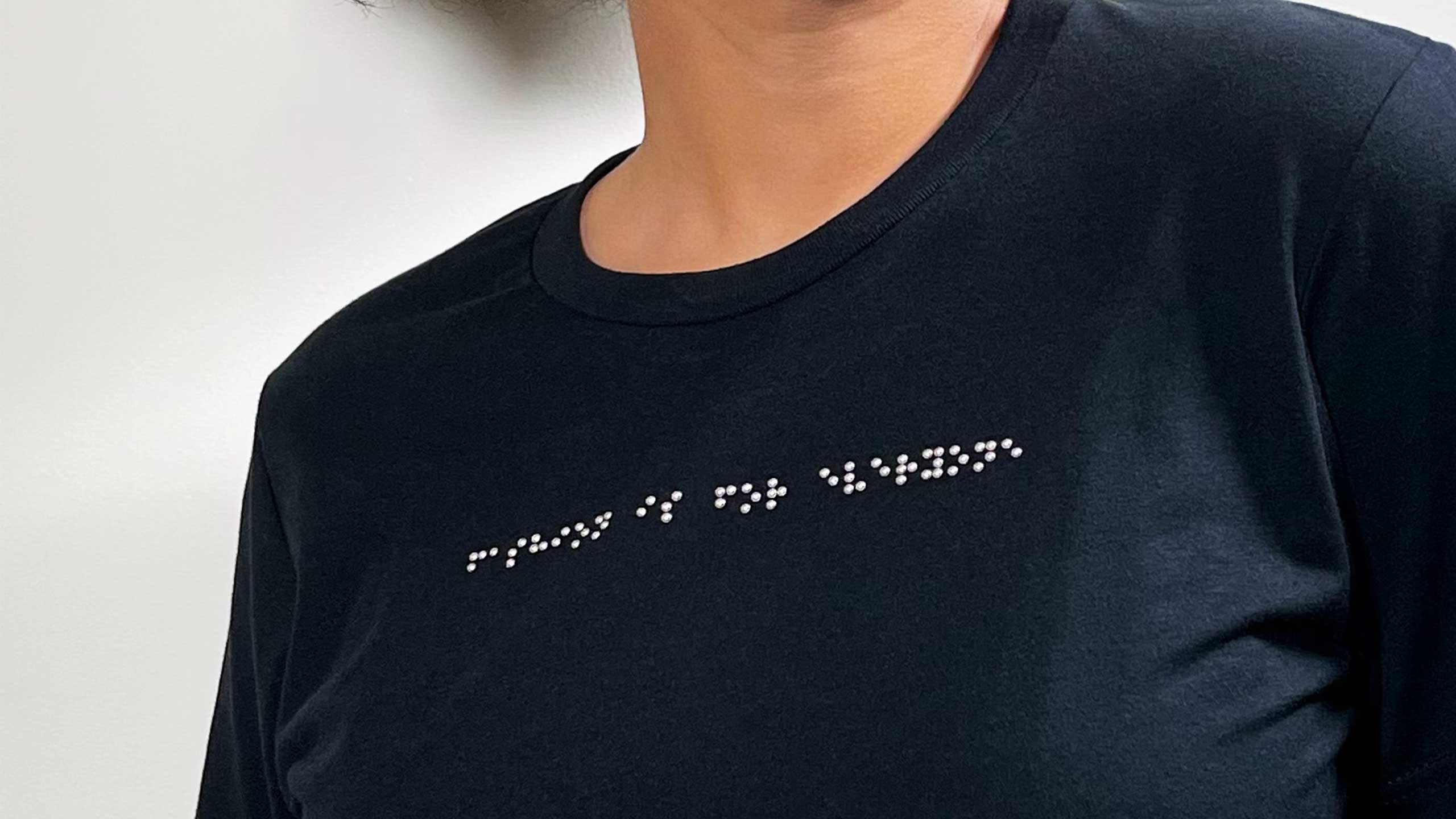By Thea Gribilas
When Alexa Jovanovic was coming up with a topic for her capstone project at Ryerson’s School of Fashion in 2016, she knew she wanted to work with a misrepresented community and create some form of social change.
Jovanovic always loved beaded clothing and, after a day out shopping, she began to question why beaded clothing didn’t have a function beyond its aesthetic value. She ultimately decided to work on braille beaded clothing to make fashion more accessible for those who are visually impaired.
Jovanovic did some preliminary research and quickly found that nothing remotely similar existed. As a sighted person herself, she closely studied braille, consulted with the visually-impaired community on what they’d want to see on the products and its legibility. She then began to develop the brand which would become Aille Design—pronounced ‘eye.’
Upon completing her capstone project, Jovanovic began looking for a master’s program that would allow her to continue her research. Ultimately, she was unable to find a good fit and continued working in various positions at Ryerson while researching.
“[While working at Ryerson] I was constantly being inspired and motivated to continue my research and find different ways to progress the idea,” she said.
But while Jovanovic was continuing her research, society was only beginning to become more familiar with the idea of equity and representation, she said.
“To be honest, the world just wasn’t ready for increased inclusivity,” said Jovanovic. “The idea was just so abstract. It wasn’t trendy at the time, like it is now.”
After three years of hard work, Aille Design began to take off in May 2019. Jovanovic received a call from a producer at CTV looking to feature individuals in the fashion industry who were working with the disability communities to create new products.
Soon after her interview with CTV, Jovanovic was invited to join the Fashion Zone at Ryerson in the fall of 2019, where she continued her work on Aille Design. Ryerson’s Fashion Zone is an incubator for fashion and technology that provides funding and growth opportunities for Canadian fashion innovators.
It was at the Fashion Zone that she began designing her pieces. In January 2020, Jovanovic rebranded Aille Design as a business rather than a research project, and began developing a prototype.
During the process, she worked closely with people with visual impairments. They helped her decide the phrases that would be beaded onto the clothes and the legibility of those phrases.
Jovanovic continues to consult people with visual impairments as much as possible during the production of Aille Design’s products. Currently, they’re involved in the design, brainstorming, marketing and communications aspects.
Aille Design in a virtual world
Since the beginning of the pandemic, Aille Design has been forced to function and grow in a virtual business landscape. Jovanovic said that in some ways, this has actually been beneficial for the business.
“It actually became far easier and far more efficient and economically friendly for a small business to be able to secure meetings with individuals all over the world,” she said.
Virtual meetings becoming more common during the pandemic has allowed Aille Design to expand internationally. The brand is now working with people in the U.S., United Kingdom and Japan.
“It’s been interesting to find the positives of the challenges of COVID,” said Jovanovic.
COVID-19 has also forced Aille Design to grow their brand at a slower rate because of the lack of demand for new products. Jovanovic said she’s had to be strategic in deciding what pieces to launch, because new products aren’t as in-demand during the pandemic.
To date, Aille Design has launched T-shirts and masks that feature words beaded in braille on its online store.
Once the pandemic eases up, Jovanovic hopes to include individuals with visual impairments in every stage of Aille Design, including the manufacturing of products.
“[It’s important to] really be an example to others in the industry on how we can properly integrate individuals who identify as having disabilities into the fashion industry,” said Jovanovic.
Jovanovic believes inclusivity has come more to the forefront of fashion in recent years. However, she noted that individuals with disabilities are still often overlooked in the wider conversation of inclusivity and diversity in general.
“A big thing is really just awareness,” Jovanovic said. “Being able to bring more attention to the mainstream level…awareness is the key factor that will play into that.”













Sally
I work at the library for the blind in Daytona beach Florida and I think this is an awsome idea would like to know more about your products. I am not blind but many of my friends here are and I think they would love this.I am wondering about the cost?